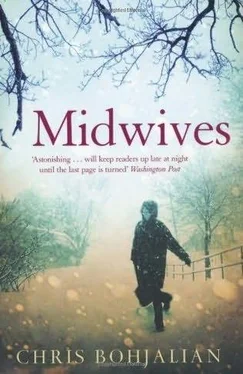Chris Bohjalian - Midwives
Здесь есть возможность читать онлайн «Chris Bohjalian - Midwives» весь текст электронной книги совершенно бесплатно (целиком полную версию без сокращений). В некоторых случаях можно слушать аудио, скачать через торрент в формате fb2 и присутствует краткое содержание. Жанр: Современная проза, на английском языке. Описание произведения, (предисловие) а так же отзывы посетителей доступны на портале библиотеки ЛибКат.
- Название:Midwives
- Автор:
- Жанр:
- Год:неизвестен
- ISBN:нет данных
- Рейтинг книги:5 / 5. Голосов: 1
-
Избранное:Добавить в избранное
- Отзывы:
-
Ваша оценка:
- 100
- 1
- 2
- 3
- 4
- 5
Midwives: краткое содержание, описание и аннотация
Предлагаем к чтению аннотацию, описание, краткое содержание или предисловие (зависит от того, что написал сам автор книги «Midwives»). Если вы не нашли необходимую информацию о книге — напишите в комментариях, мы постараемся отыскать её.
Midwives — читать онлайн бесплатно полную книгу (весь текст) целиком
Ниже представлен текст книги, разбитый по страницам. Система сохранения места последней прочитанной страницы, позволяет с удобством читать онлайн бесплатно книгу «Midwives», без необходимости каждый раз заново искать на чём Вы остановились. Поставьте закладку, и сможете в любой момент перейти на страницу, на которой закончили чтение.
Интервал:
Закладка:

Chris Bohjalian
Midwives
© 1997
PROLOGUE
THROUGHOUT THE LONG summer before my mother's trial began, and then during those crisp days in the fall when her life was paraded publicly before the county-her character lynched, her wisdom impugned-I overheard much more than my parents realized, and I understood more than they would have liked.
Through the register in the floor of my bedroom I could listen to the discussions my parents would have with my mother's attorney in the den late at night, after the adults had assumed I'd been sleeping for hours. If the three of them happened to be in the suite off the kitchen my mother used as her office and examining room, perhaps searching for an old document in her records or a patient's prenatal history, I would lie on the bathroom floor above them and listen as their words traveled up to me through the holes that had been cut for the water pipes to the sink. And while I never went so far as to lift the receiver of an upstairs telephone when I heard my mother speaking on the kitchen extension, often I stepped silently down the stairs until I could hear every word that she said. I must have listened to dozens of phone conversations this way-standing completely still on the bottom step, invisible from the kitchen because the phone cord stretched barely six feet-and by the time the trial began, I believe I could have reconstructed almost exactly what the lawyer, friend, or midwife was saying at the other end of the line.
I was always an avid parent watcher, but in those months surrounding the trial I became especially fanatic. I monitored their fights, and noted how the arguments grew nasty fast under pressure; I listened to them apologize, one of them often sobbing, and then I'd wait for the more muffled (but still decipherable) sounds they would make when they would climb into bed and make love. I caught the gist of their debates with doctors and lawyers, I understood why some witnesses would be more damning than others, I learned to hate people I'd never met and whose faces I'd never seen. The state's medical examiner. The state's attorney. An apparently expert midwife from Washington, D.C.
The morning the judge gave the jury its instructions and sent them away to decide my mother's fate, I overheard her attorney explain to my parents what he said was one of the great myths in litigation: You can tell what a jury has decided the moment they reenter the courtroom after their deliberations, by the way they look at the defendant. Or refuse to look at him. But don't believe it, he told them. It's just a myth.
I was fourteen years old that fall, however, and it sounded like more than a myth to me. It had that ring of truth to it that I heard in many wives'-and midwives'-tales, a core of common sense hardened firm by centuries of observation. Babies come when the moon is full. If the boiled potatoes burn, it'll rain before dark. A bushy caterpillar's a sign of a cold winter. Don't ever sugar till the river runs free.
My mother's attorney may not have believed the myth that he shared with my parents, but I sure did. It made sense to me. I had heard much over the past six months. I'd learned well which myths to take to my heart and which ones to discard.
And so when the jury filed into the courtroom, an apostolic procession of twelve, I studied their eyes. I watched to see whether they would look at my mother or whether they would look away. Sitting beside my father in the first row, sitting directly behind my mother and her attorney as I had every day for two weeks, I began to pray to myself, Please don't look at your shoes, please don't look at the judge. Don't look down or up or out the window. Please, please, look at me, look at my mother. Look at us, look here, look here, look here.
I'd watched the jurors for days, I'd seen them watch me. I'd counted beards, I'd noted wrinkles, I'd stared beyond reason and courtesy at the way the fellow who would become the foreman had sat with his arms folded across his chest, hiding the hand disfigured years earlier by a chain saw. He had a thumb but no fingers.
They walked in from the room adjacent to their twelve chairs and found their seats. Some of the women crossed their legs at their knees, one of the men rubbed his eyes and rocked his chair back for a brief second on its rear legs. Some scanned the far wall of the courtroom, some looked toward the exit sign above the front door as if they realized their ordeal was almost over and emancipation was at hand.
One, the elderly woman with white hair and a closet full of absolutely beautiful red flowered dresses, the woman who I was sure was a Lipponcott from Craftsbury, looked toward the table behind which the state's attorney and his deputy were sitting.
And that's when I broke down. I tried not to, but I could feel my eyes fill with tears, I could feel my shoulders beginning to quiver. I blinked, but a fourteen-year-old girl's eyelids are no match for the lament I had welling inside me. My cries were quiet at first, the sound of a mournful whisper, but they gathered fury fast. I have been told that I howled.
And while I am not proud of whatever hysteria I succumbed to that day in the courtroom, I am not ashamed of it either. If anyone should feel shame for whatever occurred that moment in a small courthouse in northeastern Vermont, in my mind it is the jury: Amidst my sobs and wails, people have said that I pleaded aloud, "Look at us! Oh, God, please, please look at us!" and still not one of the jurors would even glance in my mother's or my direction.
Part One
Chapter 1.
I USED THE WORD vulva as a child the way some kids said butt or penis or puke. It wasn't a swear exactly, but I knew it had an edge to it that could stop adults cold in their tracks. Vulva was one of those words that in every household but ours conveyed emotion and sentiments at the same time that it suggested a simple part of the basic human anatomy for one sex or an act-like vomiting-that was a pretty basic bodily function.
I remember playing one afternoon at Rollie McKenna's, while her mother had a friend of hers visiting from Montpelier. It was one of those rare summer days in Vermont when the sky is so blue it looks almost neon-the sort of blue we get often in January on those days when the temperature won't climb above zero and the smoke from your neighbor's woodstove looks as if it will freeze when it first appears just above the tip of the chimney, but rarely in June or July.
Like Mrs. McKenna, her friend worked for the state education department. As the two adults sat around a wrought-iron table on the McKennas' brick terrace (a terrace that seemed inappropriately elegant to me even then), sipping iced tea with mint leaves from my own mother's garden, I proceeded to tell them about Cynthia Charbonneau's delivery in all the detail I could muster.
"Mrs. Charbonneau's baby was nine pounds, two ounces, but my mom was able to massage the vagina and stretch the muscles so the perineum didn't tear. Most women who have babies that are around nine pounds have to have episiotomies-that's where you cut the perineum from a lady's vagina to her anus-but not Mrs. Charbonneau. Her vulva's fine. And the placenta came right behind Norman-that's what they named the baby-by, like, two minutes. My mom says the placenta was big, too, and it's buried right now by this maple tree Mr. Charbonneau planted in their front yard. My dad says he hopes their dog doesn't dig it up, but he might. The dog, that is."
I was probably nine at the time, which meant that the McKennas had lived in Vermont for a little over a year, since they had arrived in our town from a Westchester suburb of New York City on my eighth birthday-literally, right on the day. When the moving van started chugging up the small hill in front of our house, I told my dad I expected it would turn left into our driveway and unload my presents.
Читать дальшеИнтервал:
Закладка:
Похожие книги на «Midwives»
Представляем Вашему вниманию похожие книги на «Midwives» списком для выбора. Мы отобрали схожую по названию и смыслу литературу в надежде предоставить читателям больше вариантов отыскать новые, интересные, ещё непрочитанные произведения.
Обсуждение, отзывы о книге «Midwives» и просто собственные мнения читателей. Оставьте ваши комментарии, напишите, что Вы думаете о произведении, его смысле или главных героях. Укажите что конкретно понравилось, а что нет, и почему Вы так считаете.











